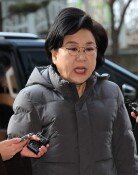Koreas Future Depends on Powers of Science and Engineering.
Koreas Future Depends on Powers of Science and Engineering.
Posted January. 25, 2004 22:47,
A new measurein which over 50 percent of college students studying science and engineering can enjoy the exemption of school expenses through scholarships, loans without interest, and research fundsis to be phased in through 2007.
Furthermore, a new system is to be introduced as well, allowing science and engineering colleges to take a lead in retraining workers and manages database regarding the intellectuals in the fields of science and technology, such as their employment status and wage levels.
At the end of February, the measure to advance the fields of science and engineering will be formed with the cooperation of other ministries and implemented within the year. This measure includes unprecedented actions to support students in these fields, said high-ranking government officials yesterday.
The government has decided, until 2007, to support entire school costs for over half of college students studying science and engineering through either scholarship or loans without interest, with the aim of nurturing exceptional and talented human resources.
To meet this goal, a national scholarship, which is awarded to an average of 3.4 percent of students per academic year in this field, is to be expended gradually; loans without interest are also expected to grow. Last year, 50,029 (7.3 percent of students of four-year universities) took advantage of it.
Besides, plans encouraging students to participate in projects ordered by the government are currently being considered in order to assist them in paying school fees.
As the same time, the Ministry of Education and Human Resources Development announced yesterday that $53 billion will be available to support 12,673 graduate students, undergraduate students, and new students for the year 2004.
More specifically, this action exempts 5,300 new students from all of their school fees, which amounts to $26.5 billion, provides $20.5 billion to 5,873 undergraduate students, and another $60 billion to 1,500 graduate studentseach receiving $4 million, respectively.
In addition, the government is considering the possibility of redirecting colleges to institutions for retraining industrial work forces, with the aim of inducing their voluntary restructuring.
In other words, some majors, whose supply surpasses the work demands of the industry, can be integrated with other majors or reduced; faculty members of these majors will be reassigned to courses for retraining industrial work forces.
In addition, the Penal DB System, a database expected to assist the government in selectively managing talented human resources in the fields of technology and science, is being considered as another potential tool.
The database will manage 10,000 PhD holders in this field, national and international alike, accounting for 10 percent of the total number of an expected work force of 100,000. This includes employment status, careers, changes, wages, plans after retirement and so forth.
This system is a unique human resources management tool comprehensively controlled by the government to trace lifetime careers and the wage changes of the major brains in core technology and science fields throughout the world, revealed a report presented by Korea Science and Engineering Foundation (chief director Kim Jeong-deok) to the Ministry of Science and Technology.
Ki-Jeong Ko Seong-Chul Hong koh@donga.com sungchul@donga.com







